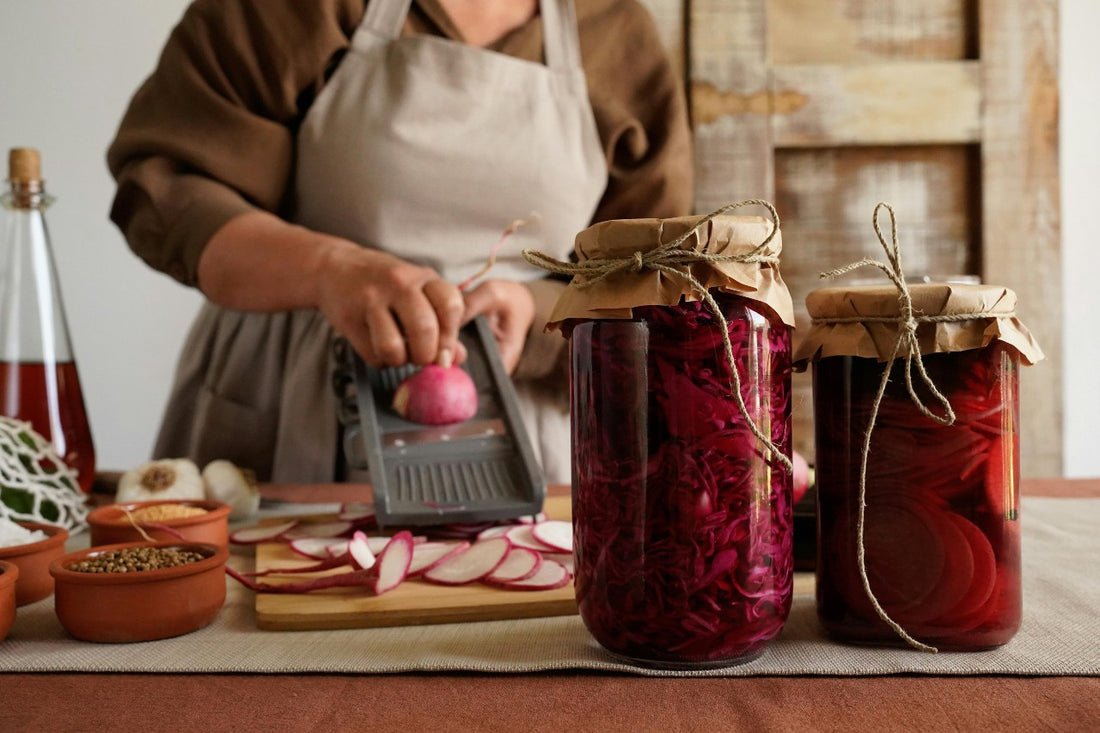Because fruits contain a high amount of nutrients and are easily perishable, the choice of container used to store them plays a significant role in their preservation, especially over a long period. Containers like glass food storage jars offer a great range of health benefits in preserving food, especially fruit preserves.
Compared to plastic jars, a lot of homemakers and brands prefer using glass storage food jars because of their preservative properties and how aesthetically appealing it is, especially coloured glass jars. In this article, we will share 8 health benefits to further boost your confidence in using glass food jars for storing your preserves.
Health Benefits of Storing Preserves in Food Storage Jars

1. They Are Chemical-Free
Plastic containers can contain harmful chemicals like BPA, which poses health risks. Glass food storage jars are chemical-free containers including coloured glass jars. This is because these glass jars are made from inert glass materials. Regardless of how long preserves are stored in a glass jar with lids, it does not leach chemicals into the food which is something plastic containers do over time.
2. It Preserves Fruits' Natural Flavour
Glass jars with lids are known for their ability to lock in the natural flavours of food. This ensures that the original taste of the fruit is retained regardless of how long it is stored. One of the major reasons for this is the non-porosity or impermeability of glass. This is usually unlike some other materials that can absorb and transfer odours.
With glass jars with lids, you can trust that the taste of your preserves will remain unaffected by external factors whether it is clear or coloured glass jars with lids.
3. It Preserves Fruit’s Freshness
What’s a fruit without its freshness? One of the attributes everyone looks for in fruits is their freshness this is something we still want to achieve when we store them as preserves. Food storage jars help retain the flavour and maintain the freshness of fruit preserves.
When these preserves are sealed properly in an airtight container, it prevents mould and bacteria from growing which often leads to spoilage. Coloured glass jars also help to block out harmful UV rays, which can degrade the quality of your preserves over time. This ensures you can enjoy your seasonal fruits all year round while maintaining their freshness.
4. It Encourages Healthy Eating
Having different homemade fruit preserves stored in glass jars can encourage healthier eating habits. Having these preserves readily available, you're more likely to consume a more nutritious snack.
These glass jars also make it easier to access your preserves, which can be a healthier alternative to store-bought snacks t is a simple yet effective way to promote a balanced diet.
5. It Preserves Fruits Nutrients
One of the primary reasons why glass jars are preferred for storing preserves is their ability to protect the nutritional content of food. Consistent exposure of fruit preserves to air, moisture, and sometimes light, can degrade the vitamins and minerals in them.
The airtight seals, alongside clear and coloured glass jars, can reduce the amount of light that reaches the preserve, which further protects the fruit's nutrients. This is why glass jars are recommended for storing them and ensuring when they are consumed, their nutrients are preserved.
6. Reduces the Risk of Consuming Contaminated Food
Proper storage of fruit preserves is important to help avoid food spoilage and contamination. Glass jars with lids always have a tight seal, that keeps out harmful bacteria and contaminants which plastic containers may not always offer especially due to their tendency to break, and allow air or contaminants flow into them, increasing the risk of spoilage. When you store your fruit preserves in glass food storage jars, you reduce the likelihood of consuming spoiled or contaminated food, thereby promoting better health.
7. Protects You from Foodborne Pathogens
Foodborne pathogens, like Salmonella and E. coli, can pose serious health risks to individuals when consumed. The airtight seal of glass jars helps prevent these pathogens by keeping the fruit preserves in a controlled environment, where contamination is minimized.
One of the advantages of using glass jars with lids is the ability to sterilize them by boiling them without having them crack. This sterilization process ensures the food jars are safe enough to preserve fruits.
8. Environmentally Friendly
Another significant health benefit of using glass food storage jars for storing fruit preserves is that they are an eco-friendly and sustainable option. Glass is 100% recyclable and can be reused multiple times without losing quality. This is unlike plastic containers that contribute to landfill waste. Glass jars help ensure a cyclical economy making the environment healthier for living.
Frequently Asked Questions
Why are glass storage jars better for fruit preserves?
Glass storage jars are better for fruit preserves because they are chemical-free, non-porous, and provide an airtight seal. This helps maintain the natural flavour, freshness, and nutritional content of the preserves while reducing the risk of contamination.
Can coloured glass jars affect the quality of fruit preserves?
Coloured jars can help protect the quality of fruit preserves. The coloured glass reduces light exposure, which can otherwise degrade the nutrients in the fruit. This makes them a great choice for storing preserves for long periods.
How can I sterilize glass jars for storing preserves?
You can sterilise jars by boiling them in water for up to 10 minutes before using them. This process helps eliminate any bacteria or pathogens that could spoil your preserves.
How long can fruit preserves last in glass jars?
When properly sealed and stored in a cool, dark place, fruit preserves can last for up to a year or more in glass jars, depending on the type of preserve and storage conditions.

